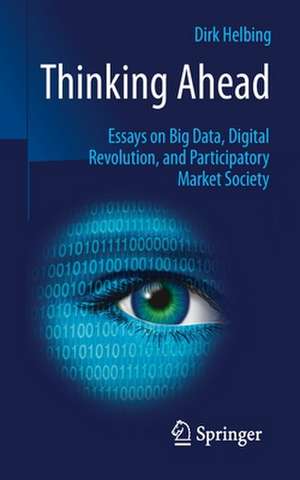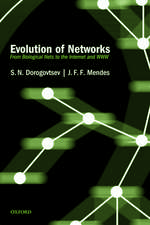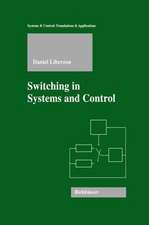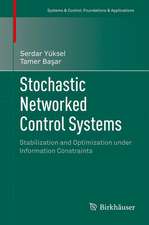Thinking Ahead - Essays on Big Data, Digital Revolution, and Participatory Market Society
Autor Dirk Helbingen Limba Engleză Paperback – 21 apr 2015
The author
Physicist Dirk Helbing is Professor of Computational Social Science at the Department of Humanities, Social and Political Sciences and an affiliate of the Computer Science Department at ETH Zurich, as well as co-founder of ETH’s Risk Center. He is internationally known for the scientific coordination of the FuturICT Initiative which focuses on using smart data to understand techno-socio-economic systems.
“Prof. Helbing has produced an insightful and important set of essays on the ways in which big data and complexity science are changing our understanding of ourselves and our society, and potentially allowing us to manage our societies much better than we are currently able to do. Of special note are the essays that touch on the promises of big data along with the dangers...this is material that we should all become familiar with!” Alex Pentland, MIT, author of Social Physics: How Good Ideas Spread - The Lessons From a New Science
"Dirk Helbing has established his reputation as one of the leading scientific thinkers on the dramatic impacts of the digital revolution on our society and economy. Thinking Ahead is a most stimulating and provocative set of essays which deserves a wide audience.” Paul Ormerod, economist, and author of Butterfly Economics and Why Most Things Fail.
"It is becoming increasingly clear that many of our institutions and social structures are in a bad way and urgently need fixing. Financial crises, international conflicts, civil wars and terrorism, inaction on climate change, problems of poverty, widening economic inequality, health epidemics, pollution and threats to digital privacy and identity are just some of the major challenges that we confront in the twenty-first century. These issues demand new and bold thinking, and that is what Dirk Helbing offers in this collection of essays. If even a fraction of these ideas pay off, the consequences for global governance could be significant. So this is a must-read book for anyone concerned about the future." Philip Ball, science writer and author of Critical Mass
“This collection of papers, brought together by Dirk Helbing, is both timely and topical. It raises concerns about Big Data, which are truly frightening and disconcerting, that we do need to be aware of; while at the same time offering some hope that the technology, which has created the previously unthought-of dangers to our privacy, safety and democracy can be the means to address these dangers by enabling social, economic and political participation and coordination, not possible in the past. It makes for compelling reading and I hope for timely action.”Eve Mitleton-Kelly, LSE, author of Corporate Governance and Complexity Theory and editor of Co-evolution of Intelligent Socio-technical Systems
Preț: 129.31 lei
Preț vechi: 161.64 lei
-20% Nou
Puncte Express: 194
Preț estimativ în valută:
24.75€ • 26.89$ • 20.80£
24.75€ • 26.89$ • 20.80£
Carte disponibilă
Livrare economică 31 martie-14 aprilie
Preluare comenzi: 021 569.72.76
Specificații
ISBN-13: 9783319150772
ISBN-10: 3319150774
Pagini: 194
Ilustrații: XIII, 194 p.
Dimensiuni: 127 x 190 x 15 mm
Greutate: 0.2 kg
Ediția:2015
Editura: Springer International Publishing
Colecția Springer
Locul publicării:Cham, Switzerland
ISBN-10: 3319150774
Pagini: 194
Ilustrații: XIII, 194 p.
Dimensiuni: 127 x 190 x 15 mm
Greutate: 0.2 kg
Ediția:2015
Editura: Springer International Publishing
Colecția Springer
Locul publicării:Cham, Switzerland
Public țintă
Popular/generalCuprins
Preface.- Introduction—Have We Opened Pandora’s Box?.- Lost Robustness.- How and Why Our Conventional Economic Thinking Causes Global Crises.- “Networked Minds” Require A Fundamentally New Kind of Economics.- A New Kind of Economy is Born—Social Decision-Makers Beat the ”Homo Economicus”.- Global Networks Must Be Redesigned.- Big Data—A Powerful New Resource for the 21st Century8.- Google as God? Opportunities and Risks of the Information Age.- From Technology-Driven Society to Socially Oriented Technology: The Future of Information Society—Alternatives to Surveillance.- Big Data Society: Age of Reputation or Age of Discrimination?.- Big Data, Privacy, and Trusted Web: What Needs to Be Done.- What the Digital Revolution Means for Us.- Creating (“Making”) a Planetary Nervous System as Citizen Web.
Recenzii
“The book makes for a most compelling andstimulating read, especially as it provides useful references for policymakers, corporations, and individuals.” (Sandhya Jane, Computing Reviews, September,2015)
“Prof. Helbing has produced an insightful and important set of essays on the ways in which big data and complexity science are changing our understanding of ourselves and our society, and potentially allowing us to manage our societies much better than we are currently able to do. Of special note are the essays that touch on the promises of big data along with the dangers...this is material that we should all become familiar with!” Alex Pentland, MIT, author of Social Physics: How Good Ideas Spread - The Lessons From a New Science
"Dirk Helbing has established his reputation as one of the leading scientific thinkers on the dramatic impacts of the digital revolution on our society and economy. Thinking Ahead is a most stimulating and provocative set of essays which deserves a wide audience.” Paul Ormerod, economist, and author of Butterfly Economics and Why Most Things Fail.
"It is becoming increasingly clear that many of our institutions and social structures are in a bad way and urgently need fixing. Financial crises, international conflicts, civil wars and terrorism, inaction on climate change, problems of poverty, widening economic inequality, health epidemics, pollution and threats to digital privacy and identity are just some of the major challenges that we confront in the twenty-first century. These issues demand new and bold thinking, and that is what Dirk Helbing offers in this collection of essays. If even a fraction of these ideas pay off, the consequences for global governance could be significant. So this is a must-read book for anyone concerned about the future." Philip Ball, science writer and author of Critical Mass
“This collection of papers, brought together by Dirk Helbing, is both timely and topical. It raises concerns about Big Data, which are truly frightening and disconcerting, that we do need to be aware of; while at the same time offering some hope that the technology, which has created the previously unthought-of dangers to our privacy, safety and democracy can be the means to address these dangers by enabling social, economic and political participation and coordination, not possible in the past. It makes for compelling reading and I hope for timely action.”
Eve Mitleton-Kelly, LSE, author of Corporate Governance and Complexity Theory and editor of Co-evolution of Intelligent Socio-technical Systems
“Prof. Helbing has produced an insightful and important set of essays on the ways in which big data and complexity science are changing our understanding of ourselves and our society, and potentially allowing us to manage our societies much better than we are currently able to do. Of special note are the essays that touch on the promises of big data along with the dangers...this is material that we should all become familiar with!” Alex Pentland, MIT, author of Social Physics: How Good Ideas Spread - The Lessons From a New Science
"Dirk Helbing has established his reputation as one of the leading scientific thinkers on the dramatic impacts of the digital revolution on our society and economy. Thinking Ahead is a most stimulating and provocative set of essays which deserves a wide audience.” Paul Ormerod, economist, and author of Butterfly Economics and Why Most Things Fail.
"It is becoming increasingly clear that many of our institutions and social structures are in a bad way and urgently need fixing. Financial crises, international conflicts, civil wars and terrorism, inaction on climate change, problems of poverty, widening economic inequality, health epidemics, pollution and threats to digital privacy and identity are just some of the major challenges that we confront in the twenty-first century. These issues demand new and bold thinking, and that is what Dirk Helbing offers in this collection of essays. If even a fraction of these ideas pay off, the consequences for global governance could be significant. So this is a must-read book for anyone concerned about the future." Philip Ball, science writer and author of Critical Mass
“This collection of papers, brought together by Dirk Helbing, is both timely and topical. It raises concerns about Big Data, which are truly frightening and disconcerting, that we do need to be aware of; while at the same time offering some hope that the technology, which has created the previously unthought-of dangers to our privacy, safety and democracy can be the means to address these dangers by enabling social, economic and political participation and coordination, not possible in the past. It makes for compelling reading and I hope for timely action.”
Eve Mitleton-Kelly, LSE, author of Corporate Governance and Complexity Theory and editor of Co-evolution of Intelligent Socio-technical Systems
Notă biografică
Dirk Helbing is Professor of Sociology, in particular of Modeling and Simulation, at the Department of Humanities, Social and Political Sciences and member of the Computer Science Department at ETH Zurich, as well as co-founder of ETH Zurich’s Risk Center. He is internationally known for the scientific coordination of the FuturICT Initiative (http://www.futurict.eu), which focuses on the understanding of techno-socioeconomic systems, using Smart Data. Helbing is elected member of the German Academy of Sciences “Leopoldina” and worked in the World Economic Forum’s Global Agenda Council on Complex Systems. He is also a board member of the Global Brain Institute in Brussels and of the International Centre for Earth Simulation (ICES) in Geneva.
Textul de pe ultima copertă
The rapidly progressing digital revolution is now touching the foundations of the governance of societal structures. Humans are on the verge of evolving from consumers to prosumers, and old, entrenched theories – in particular sociological and economic ones – are falling prey to these rapid developments. The original assumptions on which they are based are being questioned. Each year we produce as much data as in the entire human history - can we possibly create a global crystal ball to predict our future and to optimally govern our world? Do we need wide-scale surveillance to understand and manage the increasingly complex systems we are constructing, or would bottom-up approaches such as self-regulating systems be a better solution to creating a more innovative, more successful, more resilient, and ultimately happier society? Working at the interface of complexity theory, quantitative sociology and Big Data-driven risk and knowledge management, the author advocates the establishment of new participatory systems in our digital society to enhance coordination, reduce conflict and, above all, reduce the “tragedies of the commons,” resulting from the methods now used in political, economic and management decision-making.
The author
Physicist Dirk Helbing is Professor of Computational Social Science at the Department of Humanities, Social and Political Sciences and an affiliate of the Computer Science Department at ETH Zurich, as well as co-founder of ETH’s Risk Center. He is internationally known for the scientific coordination of the FuturICT Initiative which focuses on using smart data to understand techno-socio-economic systems.
“Prof. Helbing has produced an insightful and important set of essays on the ways in which big data and complexity science are changing our understanding of ourselves and our society, and potentially allowing us to manage our societies much better than we are currently able to do. Of special note are the essays that touch on the promises of big data along with the dangers...this is material that we should all become familiar with!” Alex Pentland, MIT, author of Social Physics: How Good Ideas Spread - The Lessons From a New Science
"Dirk Helbing has established his reputation as one of the leading scientific thinkers on the dramatic impacts of the digital revolution on our society and economy. Thinking Ahead is a most stimulating and provocative set of essays which deserves a wide audience.” Paul Ormerod, economist, and author of Butterfly Economics and Why Most Things Fail.
"It is becoming increasingly clear that many of our institutions and social structures are in a bad way and urgently need fixing. Financial crises, international conflicts, civil wars and terrorism, inaction on climate change, problems of poverty, widening economic inequality, health epidemics, pollution and threats to digital privacy and identity are just some of the major challenges that we confront in the twenty-first century. These issues demand new and bold thinking, and that is what Dirk Helbing offers in this collection of essays. If even a fraction of these ideas pay off, the consequences for global governance could be significant. So this is a must-read book for anyone concerned about the future." Philip Ball, science writer and author of Critical Mass
“This collection of papers, brought together by Dirk Helbing, is both timely and topical. It raises concerns about Big Data, which are truly frightening and disconcerting, that we do need to be aware of; while at the same time offering some hope that the technology, which has created the previously unthought-of dangers to our privacy, safety and democracy can be the means to address these dangers by enabling social, economic and political participation and coordination, not possible in the past. It makes for compelling reading and I hope for timely action.”Eve Mitleton-Kelly, LSE, author of Corporate Governance and Complexity Theory and editor of Co-evolution of Intelligent Socio-technical Systems
The author
Physicist Dirk Helbing is Professor of Computational Social Science at the Department of Humanities, Social and Political Sciences and an affiliate of the Computer Science Department at ETH Zurich, as well as co-founder of ETH’s Risk Center. He is internationally known for the scientific coordination of the FuturICT Initiative which focuses on using smart data to understand techno-socio-economic systems.
“Prof. Helbing has produced an insightful and important set of essays on the ways in which big data and complexity science are changing our understanding of ourselves and our society, and potentially allowing us to manage our societies much better than we are currently able to do. Of special note are the essays that touch on the promises of big data along with the dangers...this is material that we should all become familiar with!” Alex Pentland, MIT, author of Social Physics: How Good Ideas Spread - The Lessons From a New Science
"Dirk Helbing has established his reputation as one of the leading scientific thinkers on the dramatic impacts of the digital revolution on our society and economy. Thinking Ahead is a most stimulating and provocative set of essays which deserves a wide audience.” Paul Ormerod, economist, and author of Butterfly Economics and Why Most Things Fail.
"It is becoming increasingly clear that many of our institutions and social structures are in a bad way and urgently need fixing. Financial crises, international conflicts, civil wars and terrorism, inaction on climate change, problems of poverty, widening economic inequality, health epidemics, pollution and threats to digital privacy and identity are just some of the major challenges that we confront in the twenty-first century. These issues demand new and bold thinking, and that is what Dirk Helbing offers in this collection of essays. If even a fraction of these ideas pay off, the consequences for global governance could be significant. So this is a must-read book for anyone concerned about the future." Philip Ball, science writer and author of Critical Mass
“This collection of papers, brought together by Dirk Helbing, is both timely and topical. It raises concerns about Big Data, which are truly frightening and disconcerting, that we do need to be aware of; while at the same time offering some hope that the technology, which has created the previously unthought-of dangers to our privacy, safety and democracy can be the means to address these dangers by enabling social, economic and political participation and coordination, not possible in the past. It makes for compelling reading and I hope for timely action.”Eve Mitleton-Kelly, LSE, author of Corporate Governance and Complexity Theory and editor of Co-evolution of Intelligent Socio-technical Systems
Caracteristici
Authored by a leading expert in the field Thought-provoking contributions on future societal structures Blends together insights from complexity theory, quantitative sociology and big data aspects of the digital revolution Includes supplementary material: sn.pub/extras












